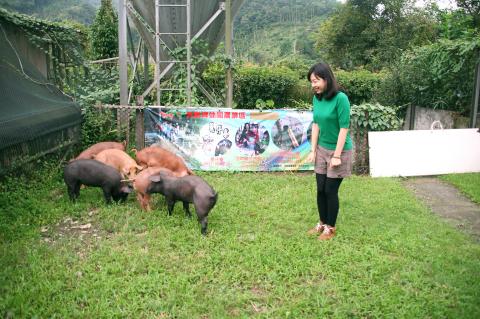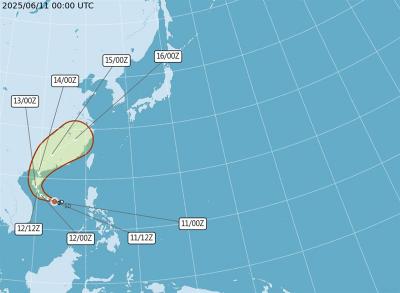“Pigs are an important livestock in the Han culture,” Huang Cheng-teh (黃正德), the owner of Tianshan Farm in Sansing Township (三星), Yilan County, told a group of visitors on Friday.
“Take the Chinese character jia [家, home] for example. It’s basically the ideogram shi [豕], meaning ‘pig’ under a roof, because for the ancient Han people, pigs were an important source of income for the family,” he said.
“The character hao [豪, wealthy], also includes the ideogram shi at the bottom, as pigs were the foundation for becoming wealthy in ancient China,” Huang said.

Photo: Loa Iok-sin, Taipei Times
All smiles, the visitors seemed to enjoy Huang’s lecture on the connection between pigs and humans in traditional culture. Though some may have thought Huang is an academic specializing in traditional “Han” culture, he’s actually been a pig farmer all his life and the “classroom” where he lectures about “pig culture” is a converted pigpen.
Aside from listening to Huang’s lecture about pigs, visitors could also play with pigs and take pictures with piglets, make pottery pigs, visit a pig farm museum, make a specialty pastry with locally produced scallions, pick specialty fruits, ride a canoe in a creek flowing in front of the farm and stay a night at the farm.
Located amid rice paddies and orchards, the farm makes for the perfect agricultural tourism attraction. Facing difficult times about a decade ago, Huang made the difficult decision to turn his piggery into a leisure farm.
“Taiwan’s entry into the WTO hit the entire agricultural sector hard,” Huang said, the smile on his face retreating. “For the pig farmers, it means more imported pork and less export of pork products from Taiwan.”
Pig farmers had already suffered a serious crisis just years before Taiwan’s admission into the WTO in 2001.
“In 1997, Japan — Taiwan’s major pork export destination — declared a ban on pork products from Taiwan because of a massive outbreak of foot-and-mouth disease and the once prosperous pig farming industry went straight to hell,” Huang said.
Before the outbreak, about 40 percent of pork products in Japan were imported from Taiwan. Even after Taiwan was removed from the list of countries with foot-and-mouth, exports never fully recovered, as Japanese importers had found other sources.
“I only had two choices: Give up, or transform my pig farm,” Huang said.
Huang chose the latter option, but the change wasn’t easy.
Traditionally, pig farmers are considered people of lower social status, as pig farms are usually associated with negative adjectives such as “dirty” and “smelly” and people did not believe that there was any way to turn a pig farm into a leisure farm, Huang said.
“I probably would have failed if I had only sought the transformation of my own pig farm, but what I did was involve everyone in the village. Here, visitors can buy a package tour from me to visit my farm, pick fruit from trees, canoe on the creek, make scallion cakes with locally produced scallion,” Huang said. “But you know what? I still only run my pig farm and the rest of the activities are run by others in the village.”
Package tours are more attractive to visitors and tours like the one he offers allow everyone in the village to share the benefits, he said, which in turn generates support from other villagers for his project.
Tea farmer Yu Huei-chen (游輝真) of Datong Township (大同) also felt the impact of globalization and transformed his 4 hectare farm in response to the challenge.
Although tea has been planted in the hilly areas of Yilan for a long time now, most Yilan tea growers were forced to give up their farms as the export market shrank and lower-cost tea from other countries took much of the domestic market.
“I was first just a tea farmer, then I became also a tea merchant, and now I am a tea farmer, a tea merchant and a leisure farm resort owner all at the same time,” Yu said.
Yu’s tea farm used to be closed to the public, and his sole business was growing and selling tea.
Now, however, people can visit his tea farm, experience tealeaf-picking, enjoy a “tealeaf feast,” buy his award-winning tea from the souvenir shop and stay a night at his country-style homestay. And if you wish, Yu said, he would be happy to chat with you about everything related to Taiwanese tea.
The tealeaf feast is quite unique, visitors having lunch in the restaurant on the farm told the Taipei Times.
“You can smell the scent of tea from this pot of chicken soup from afar, because it’s cooked with tea leaves,” a visitor said, pointing to a pot of chicken soup on the table. “When you taste it, it actually tastes just like a delicious chicken soup at first, but then, a few seconds after you swallow the soup, there’s again this scent and aftertaste of tea in your mouth.”
“Very cool, very special. I really like it,” the visitor said.
Although local governments are trying to develop leisure farm resorts to help farmers transform to meet the challenges from globalization, Yilan has been one of the most successful, because of a coordinated marketing strategy put out by both farm resort operators and the county government.
“There are leisure farm resorts everywhere across the country, but only in Yilan can you find government-certified leisure farm resorts,” said Roy Ko (柯瑞杰), general manager of the Yilan Leisure Farming Development Association, an alliance of leisure farm resort operators in the county. “All certified resorts went through a very strict evaluation process and are regularly inspected, so visitors feel safer to go to these certified farms.”
In addition, Ko said that one of the strengths of agricultural tourism in Yilan is its close distance to Taipei.
“At the moment, our objective is to attract more visitors from Japan who are coming through Songshan Airport in Taipei as the airport establishes more regular flight routes with Japan,” Ko said. “Japanese visitors can easily get to Yilan via the freeway after they arrive in Taipei.”
While other counties and cities may soon be competing with Yilan, Ko said they are trying to expand more into the cultural side of the farming sector in Yilan.
“In Yilan, many Hakka live side-by-side with Kavalan and Atayal Aborigines. Their cultures have merged into something interesting and unique,” he said.

A magnitude 6.4 earthquake struck off the coast of Hualien County in eastern Taiwan at 7pm yesterday, the Central Weather Administration (CWA) said. The epicenter of the temblor was at sea, about 69.9km south of Hualien County Hall, at a depth of 30.9km, it said. There were no immediate reports of damage resulting from the quake. The earthquake’s intensity, which gauges the actual effect of a temblor, was highest in Taitung County’s Changbin Township (長濱), where it measured 5 on Taiwan’s seven-tier intensity scale. The quake also measured an intensity of 4 in Hualien, Nantou, Chiayi, Yunlin, Changhua and Miaoli counties, as well as

Taiwan is to have nine extended holidays next year, led by a nine-day Lunar New Year break, the Cabinet announced yesterday. The nine-day Lunar New Year holiday next year matches the length of this year’s holiday, which featured six extended holidays. The increase in extended holidays is due to the Act on the Implementation of Commemorative and Festival Holidays (紀念日及節日實施條例), which was passed early last month with support from the opposition Chinese Nationalist Party (KMT) and Taiwan People’s Party. Under the new act, the day before Lunar New Year’s Eve is also a national holiday, and Labor Day would no longer be limited

COMMITMENTS: The company had a relatively low renewable ratio at 56 percent and did not have any goal to achieve 100 percent renewable energy, the report said Pegatron Corp ranked the lowest among five major final assembly suppliers in progressing toward Apple Inc’s commitment to be 100 percent carbon neutral by 2030, a Greenpeace East Asia report said yesterday. While Apple has set the goal of using 100 percent renewable energy across its entire business, supply chain and product lifecycle by 2030, carbon emissions from electronics manufacturing are rising globally due to increased energy consumption, it said. Given that carbon emissions from its supply chain accounted for more than half of its total emissions last year, Greenpeace East Asia evaluated the green transition performance of Apple’s five largest final

The first tropical storm of the year in the western North Pacific, Wutip (蝴蝶), has formed over the South China Sea and is expected to move toward Hainan Island off southern China, the Central Weather Administration (CWA) said today. The agency said a tropical depression over waters near the Paracel and Zhongsha islands strengthened into a tropical storm this morning. The storm had maximum sustained winds near its center of 64.8kph, with peak gusts reaching 90kph, it said. Winds at Beaufort scale level 7 — ranging from 50kph to 61.5kph — extended up to 80km from the center, it added. Forecaster Kuan Hsin-ping